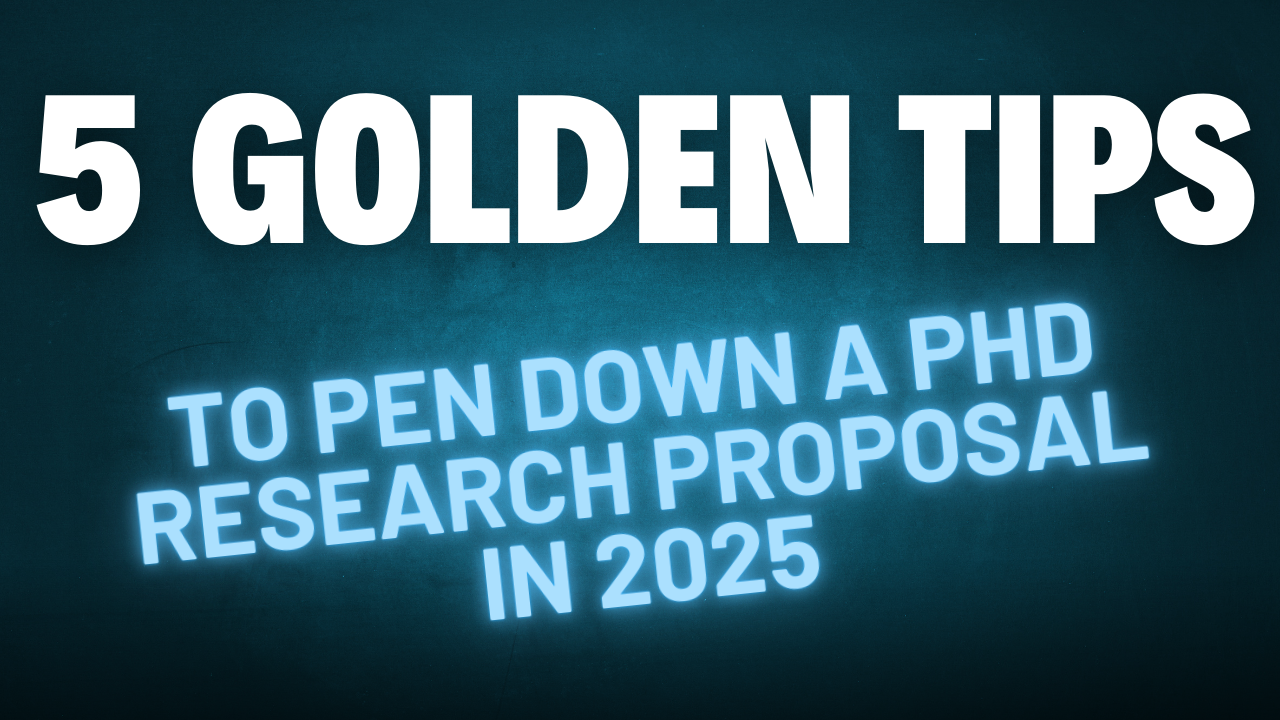5 Golden Tips to Pen Down a PhD Research Proposal in 2025
Kenfra Research - Shallo2025-01-04T16:32:34+05:30Embarking on the journey to pursue a PhD is both an exciting and challenging venture. The very first hurdle you’ll encounter is crafting a compelling research proposal. A well-structured PhD Research Proposal in 2025 not only sets the foundation for your academic journey but also plays a crucial role in securing funding, impressing your supervisors, and gaining admission into your program.
As we step into 2025, the landscape of academia is evolving, and the way PhD proposals are formulated must adapt to these changes. Here are 5 golden tips to help you pen down a standout PhD research proposal in 2025.

1. Craft a Clear and Focused Research Question
One of the most vital elements of your research proposal is the research question. A focused and clear research question lays the foundation for the entire project. The key to a successful PhD research proposal is defining a problem that is not only relevant to your field but also manageable within the scope of your doctoral studies.
In 2025, interdisciplinary research is highly encouraged, and many research areas are rapidly evolving with technological advancements. Therefore, make sure your research question addresses a contemporary issue or gap in knowledge. Your question should:
- Be specific, avoiding vague or overly broad topics.
- Be original, offering a new perspective or contribution to the field.
- Be feasible, meaning it can be researched within your time frame and resources.
For example, instead of tackling a broad topic like “Artificial Intelligence,” narrow it down to something like “The Ethical Implications of AI in Healthcare Diagnostics.” This makes it clear that you’re tackling a current issue in a specific sector, demonstrating relevance and focus.
2. Conduct a Thorough Literature Review
A well-rounded literature review is essential in establishing the academic context of your proposal. It shows that you understand the state of research in your field and that your proposed study will contribute to advancing knowledge.
In 2025, access to digital archives, open-access journals, and AI-powered research tools has made literature reviews both easier and more exhaustive. Use these tools to ensure you are up-to-date on the latest research developments. Here’s how to make your literature review impactful:
- Be comprehensive: Include a broad range of sources such as journal articles, books, and conference papers.
- Identify gaps: A great literature review doesn’t just summarize existing research; it highlights gaps or areas where research is lacking.
- Build your framework: Your review should set the stage for your research question. What theories, models, or concepts are relevant to your research?
An effective literature review will help you justify why your research is necessary and how it will address existing research gaps.
3. Clearly Define Your Methodology
Your methodology explains how you will carry out your research and demonstrates the validity of your approach. In 2025, advanced research methodologies are emerging, especially in fields such as AI, big data, and experimental sciences. Be sure to choose a methodology that is aligned with your research objectives and one that is realistic for your project’s time frame.
Here are key points to consider when defining your methodology:
- Be specific: Whether you’re using qualitative or quantitative methods, clearly describe the processes you will employ. For example, if you plan on conducting surveys, explain how they will be distributed and analyzed.
- State the tools and techniques: If you’re employing advanced technologies or software, such as machine learning tools, AI simulations, or lab equipment, make sure you specify them.
- Explain ethical considerations: Ethical concerns are of paramount importance, especially when working with human subjects, data privacy, or potentially controversial topics. Outline how you will handle these issues in your study.
Ensure that your methodology is grounded in current practices while incorporating cutting-edge advancements relevant to your field of study.
4. Highlight the Potential Impact of Your Research
Your PhD research proposal should clearly articulate the broader impact of your research. This is an essential element that academic committees are looking for in 2025. Whether it’s solving a real-world problem, advancing scientific knowledge, or contributing to societal changes, make sure you highlight the potential outcomes and benefits of your research.
In 2025, with a rapidly changing world, universities and funding agencies increasingly want to see how your research will align with the global goals. Address questions like:
- How does your research contribute to societal challenges, such as climate change, health disparities, or technological ethics?
- Will your research have practical applications in industry, policy-making, or education?
- Does it contribute to advancing knowledge in your specific field?
By emphasizing the significance of your work, you demonstrate not only academic competence but also a forward-thinking mindset.
5. Ensure Clarity, Structure, and Professionalism
The presentation of your research proposal matters as much as its content. A well-written, clear, and professionally formatted proposal will leave a lasting impression on your readers. In 2025, competition for PhD positions is fierce, and your proposal must stand out for its clarity and professional presentation.
Follow these guidelines to ensure your proposal is easy to follow:
- Use clear, concise language: Avoid jargon and overly complex sentences. While your topic may be specialized, your language should be accessible to readers from different academic backgrounds.
- Structure it logically: A typical research proposal includes an introduction, literature review, research question, methodology, and conclusion. Organize your content in a coherent flow, with each section seamlessly building on the previous one.
- Adhere to guidelines: Every university or funding body will have its own set of formatting guidelines. Be sure to follow them strictly to avoid disqualifying your proposal.
Conclusion
Writing a PhD Research Proposal in 2025 requires a combination of traditional research skills and modern approaches that reflect the ever-changing academic and technological landscape. By crafting a focused research question, conducting a thorough literature review, selecting the right methodology, highlighting the impact of your research, and ensuring clarity in presentation, you can develop a PhD Research Proposal in 2025 that stands out in a competitive academic environment.









Leave a Reply